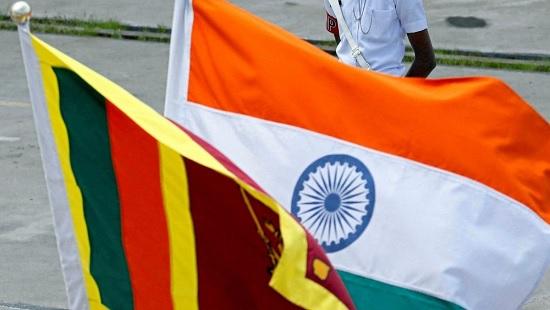30 Jan 2023 - {{hitsCtrl.values.hits}}
 By Ashanthi Warunasuriya
By Ashanthi Warunasuriya
Sri Lanka and India have enjoyed a robust relationship since independence from British colonial rule in the contemporary era. Nevertheless, both of these countries have enjoyed historical links for more than three thousand years, even before the time of Lord Buddha.
The biggest gift Sri Lanka received from India was Buddhism during the reign of Asoka the emperor and when Sri Lanka was under the benign rule of King Devanampiyatissa.
The cultural values associated with Buddhism are common to both of these countries, which fostered an unparalleled civilization in world history.
When India achieved independence from the British Raj in 1947, Sri Lanka was not far behind. It achieved dominion status in 1948 and formed a government under the premiership of D.S. Senanayake.
Aside Pandit Jawaharlal Lal Nehru served as India's first prime minister simultaneously. As both India and Sri Lanka celebrate 75 years of independence within the same time frame, it would be rather appropriate to look at the various aspects of the relationship.
President Ranil Wickremesinghe, speaking at the India-Sri Lanka Society the other day, looked back on the different forms of diplomatic relations the two countries have had in the past and how they have influenced each other for their betterment.
He highlighted democracy and trade as two modern aspects that bind the two countries together. In addition, he shared that steps would be taken to revive and upgrade the Indo-Lanka Free Trade Agreement (ILFTA) in order to boost trade ties between the countries. The President did not forget to express his appreciation towards Indian Prime Minister Narendra Modi for India’s donation of Rs. 2 billion that will be used to create new pathways for Buddhist relations between the nations.
The High Commissioner of India to Sri Lanka, Gopal Baglay, stated, "The strength of the relationship between India and Sri Lanka lies in their people-to-people ties." The closeness of history, the closeness of geography, our proximity, the shared heritage, the shared history—there is so much that binds us. "And it is just not a historical coincidence that when India woke up to the dawn of independence in 1947, Sri Lanka was not to be left far behind."
He also spoke of the upcoming anniversary that celebrates 75 years of Indo-Lanka diplomatic relations as two independent countries, with aspirations to take commemorative measures for the occasion.

At the handover ceremony of the Indian Dornier aircraft at the Sri Lanka Air Force base in Katunayake during the latter part of last year, President Ranil Wickremesinghe said that since the Commander of the Air Force and the High Commissioner have dealt at length with the aircraft, I thought I should say a few words about the special occasion today, the 75th Anniversary of Indian Independence.
Yesterday, I was listening, thanks to YouTube, to the speech made by Pandit Nehru on the day of Independence, "The Twist of Destiny." There was one passage that I thought I should quote for you. "The achievement we celebrate today is but a step." We are opening ourselves up to greater trials and accomplishments. "Are we brave enough and wise enough to grasp this opportunity and accept the challenge of the future?"
India grasped it. The way forward was shown by none other than Pandit Nehru. You reap what you sow today. India today is becoming a world power and is still growing. By the middle of the century, you'll probably see a powerful India playing a dominant role on the global stage. That itself is a tribute to Pandit Nehru.
Diverging from my speech, it just reminds me of a tribute paid to him by one of India’s politicians and one of his leading opponents, Prime Minister Vajpayee. He said he had made a speech about Pandit Nehru and called him half Churchill, half Chamberlin. That evening, he met Pandit Nehru at a dinner. And Pandit Nehru came up to him and told him, "You made a very robust speech." He then patted him on the back and walked off. That, he said, was a sign of the greatness of Pandit Nehru.
There is something more that we in Sri Lanka must mention and that a lot of people don’t know. Pandit Ji gave us full cooperation for Sri Lanka to enter the United Nations and become a member. I was told how his representative to the UN, Minister V.K. Krishna Menon, supported my father in his efforts to arrange for Sri Lanka's entry into the United Nations. My father knew him well. I only saw him at a distance as a student watching his car pass by on the way to India House.
But I had the fortune and privilege of meeting many other Indian politicians, especially Prime Minister Morarji Desai and Prime Minister Charan Singh, Prime Minister Rajiv Gandhi and Prime Minister Narasimha Rao, whom I knew very well because we were both ministers of education, and Prime Minister Inder Kumar Gujral and Prime Minister Vajpayee. They were all well-known, and of course, Prime Minister Manmohan Singh was opening up the economy when I was the Minister of Industries, as were Madam Sonia Gandhi and President Pranab Mukherjee, as well as Prime Minister Narendra Modi, to whom we must be grateful for this aircraft.
There are many others that I have come across. My advice to rising politicians in Sri Lanka, those who aspire to higher office, is to get to know your Indian colleagues. Get to know them well and learn to deal with them. If you do not do that, it will be difficult for you to look at issues and understand what each other says. We have common viewpoints in many areas. We are a small country in the middle of the ocean. At the same time, India also looks at its role as a global power.
President Ranil Wickremesinghe’s announcement during the Thaipongal celebrations in Jaffna to fully implement the 13th amendment to the constitution in a bid to resolve the ethnic question may have pleased India since it has been the consistent policy of India to settle ethnic issues within a united Sri Lanka.
The nearly three-decade-long armed conflict between Sri Lankan forces and the LTTE came to an end in May 2009. During the course of the conflict, India supported the right of the government of Sri Lanka to act against terrorist forces. At the same time, it conveyed at the highest levels its deep concern about the plight of the mostly Tamil civilian population.
The need for national consensus and reconciliation through a political settlement of the ethnic issue has been repeatedly advocated by India at the highest levels. India's constant position is for a negotiated political settlement that is acceptable to all communities within a united Sri Lanka. This settlement must respect democracy, pluralism, and respect for human rights.
Besides India and Sri Lanka enjoy a robust trade and investment relationship, with bilateral trade growing rapidly in the last decade and a number of leading Indian private sector companies investing in Sri Lanka and establishing a presence in this country. Sri Lanka is India's largest trade partner in South Asia. India, in turn, is Sri Lanka's largest trading partner globally. Trade between the two countries grew rapidly after the entry into force of the India-Sri Lanka Free Trade Agreement in March 2000. Over the next eight years, bilateral trade multiplied nearly fivefold. Following a downturn in 2009 caused by the global economic recession, trade rebounded in 2010. According to Sri Lankan statistics, bilateral trade in 2011 amounted to US $ 4.86 billion, which is about 66% higher than in 2010. In 2011, India’s exports to Sri Lanka totalled to US $ 4.3 billion, which is an increase of about 75% compared to 2010. Bilateral trade in 2012 amounted to US$ 4.002 billion, registering a decline of 17.59% as compared to the corresponding period of 2011. In recent months, the two countries have also resumed discussions on a Comprehensive Economic Partnership Agreement. Steps to finalize the agreement are expected to be taken in the near future.
Sri Lanka has also long been a priority destination for direct investment from India. India is among the four largest overall investors in Sri Lanka with cumulative investments of over US$ 800 million. India was the second largest foreign direct investor in Sri Lanka in 2011, with an investment of US$ 147 million (out of a total inbound FDI of US$ 1057 million). India’s main investments are in the areas of petroleum retail, hospitals, telecom, vanaspati, copper, and other metal industries; real estate; telecommunications; hospitality and tourism; banking and financial services; IT; and food processing (tea and fruit juices). Indian business organizations such as IOC, Tatas, Bharti Airtel, Piramal Glass, LIC, Ashok Leyland, L&T, and Taj Hotels are present in Sri Lanka.
The last few years have also witnessed an increasing trend of Sri Lankan investments in India. Significant examples include Ceylon Biscuits (Munchee brand), Carsons Cumberbatch (Carlsberg), Brandix (about US$ 1 billion to set up a garment city in Vishakapatnam), MAS Holdings, John Keels, Hayleys, and Aitken Spence (Hotels), apart from other investments in the freight servicing and logistics sector.
However, now Sri Lanka is struggling through an unprecedented economic meltdown. India has come forward to rescue the country with nearly $4 billion in economic aid. They announced their readiness to help restructure Sri Lanka’s debt portfolio as one of its main creditors. India’s external Affairs Minister Dr S Jaishankar and Sri Lanka leaders are likely to discuss the modalities during Dr Jaishankar visit to Sri Lanka on the 19th of this month.
Apart from economic cooperation, cultural cooperation is also a very critical aspect of the bilateral relationship. The Cultural Cooperation Agreement signed by the governments of India and Sri Lanka on November 29, 1977, in New Delhi forms the basis on which the periodic Cultural Exchange Programs between the two countries are signed and implemented. The Programme of Cultural Cooperation (PCC) for 2010-2013 seeks to enhance the level of cooperation in a wide variety of fields, such as performing arts, visual arts, libraries, museums, archives and cultural documentation, archaeology, handicrafts, sports and youth affairs, publications and professional exchanges, and mass media. The Indian Cultural Center in Colombo actively promotes awareness of Indian culture by offering classes in Indian music, dance, Hindi, and yoga. Every year, cultural troupes from both countries exchange visits. India is also committed to the restoration of key icons of the cultural heritage of Sri Lanka. It is setting up an Indian gallery at the International Buddhist Museum in Kandy and working on the restoration of the Thiruketheeswaram Temple in Mannar.
As both countries commemorate the 75th anniversary of independence, bilateral relations have grown steadily, with steadfast people-to-people connectivity, which is a critical aspect of the relationship, also taking shape. This is evident from the increased number of visits between citizens of both countries, including for cultural, educational, business, and tourism purposes. It is also reflected in the increased trade and investment flows between the two countries.
14 Nov 2024 3 hours ago
14 Nov 2024 4 hours ago
14 Nov 2024 4 hours ago
14 Nov 2024 4 hours ago
14 Nov 2024 5 hours ago